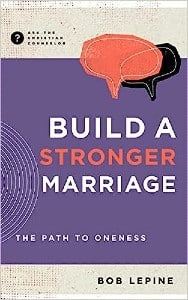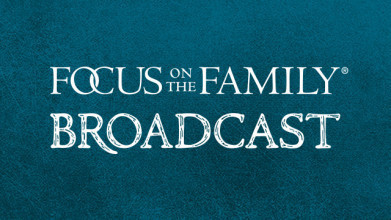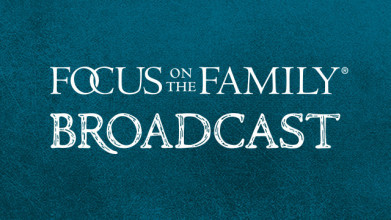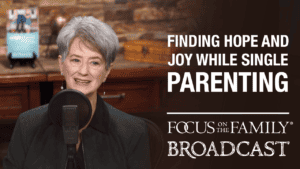Bob Lepine: I was getting ready to speak at a marriage conference, and I was listening to Focus on the Family, and Gary Smalley was on Focus on the Family.
Jim: Hm. (laughs)
Bob: And Gary Smalley in his inimitable way said, “I’m gonna tell you the one thing, if you can learn how to forgive,” he said, “that’s how to resolve conflict and forgive in a marriage, that’s the key.” And I thought, “Well, that should’ve dawned on me before now, but we’re gonna have conflict in marriage.” If we can’t figure out, what do we do when that happens, we’re always gonna have problems. But if we can figure out how to resolve conflict, then, then we can have a good marriage. And the key to that is to be generous forgivers-
Jim: Yeah.
Bob: … with one another.
John Fuller: That’s Bob Lepine, and he joins us today on Focus on the Family. Uh, thank you for being with us. Your host is Focus president and author, Jim Daly, and I’m John Fuller.
Jim Daly: You know, John, over the years, we have heard some incredible stories about marriages that have been restored. Um, coming back from the brink of disaster, It can be infidelity, it could be just the argumentative nature of the relationship. The one thing that’s so true that I’ve seen, for Jean and I is just how we push each other’s buttons at times.
John: Mm-hmm.
Jim: And I had to say to myself, not that long ago (laughs) unfortunately, like, “Why do I go there? I know I’m gonna get this reaction when I say this.” And it’s so selfish of me. And it just is part of our flesh, and I think what the Lord is trying to teach me, certainly, maybe you, the listener, uh, don’t push that button.
John: Mm-hmm.
Jim: (laughs) It doesn’t really bring any fruit, right? Try something different.
John: Yeah.
Jim: In today’s program, we’re not talking about, um, physical abuse or deep, emotional abuse. If you’re in those situations, get to a safe place, get the help you need. Uh, you can start with a call here to Focus on the Family. But we’re talking about those marriages that are just clunking along that need a little tune-up, that need some help. And today, we’re gonna talk to a great friend, Bob Lepine, and a book he’s written called Build a Stronger Marriage. That should be everybody’s goal, by the way.
John: Mm-hmm.
Jim: I love the simplicity of that title.
John: Yeah.
Jim: And I’m looking forward to the practical steps, um, practical helps that Bob will bring.
John: Uh, I am too, and um, if you would like to contact us and learn more about his book or connect with one of our counselors, our number is 800, the letter A, and the word FAMILY. And we’ve got further details at focusonthefamily.com/broadcast. And Bob is a pastor, a speaker, uh, he was for many years the co-host of Family Life Today. He’s written a number of books, and as you said, Jim, uh, we’re gonna be talking about, uh, this particular one, Build a Stronger Marriage: The Path to Oneness.
Jim: Bob, welcome to Focus. Welcome back.
Bob: It is great to be with you guys. Always look forward to the time.
Jim: I think one of the funniest memories I have of working with you and Dennis was that April Fool’s Day where-
Bob: (laughs)
Jim: … you started the Focus program together, and we started Family Life program on April 1st.
Bob: Yeah, I remember calling John-
Jim: Yeah.
Bob: … saying, “I got this-
Jim: Yeah. (laughing)
Bob: … crazy idea.”
Jim: And it worked. I mean, we had people just laughing about that.
Bob: Yeah.
Jim: And just showed the great camaraderie that we’ve always shared with you and Dennis in Family Life and Focus, so.
Bob: Well, we’re in the same line of work and the same struggle.
Jim: Yeah.
Bob: Praying about the same stuff, so it’s, it’s been great to be allied with you guys over the years.
Jim: Yeah. Appreciate it. And, as a pastor, let’s go to that component of your life experience. You’ve counseled many couples who probably hit a bump like I was describing. Little things can start piling up, right? It’s just this weird thing.
Bob: But it’s the natural course of every relationship. Y-your car, over time, starts to develop noises and clunks. And-
Jim: (laughs)
Bob: … if, if you’re not-
Jim: That’s so true. How do you know that?
Bob: ‘Cause I drive too. (laughing) And if you’re not going in for regular preventative maintenance and getting things adjusted, and tuned up, and, and tweaked, then you’re gonna find out that the car is gonna break down over time.
Jim: You know, a practical question, I’m sure, uh, a listener saying, “You know what? I’d love to do that, but time. We’re so busy. We have young kids.” Speak to the importance of getting that maintenance done.
Bob: Yeah.
Jim: I mean, it’s so funny you should say that about the car, ’cause my Toyota just lit up yesterday-
Bob: Ah.
Jim: … saying, “Maintenance required.”
Bob: Mm-hmm.
Jim: And, uh, you know, you don’t have that billboard for your marriage. It’s not a light that’ll go off on your dashboard. So, for those couples in different life stage, address that quickly, how important it is to make time.
Bob: Yeah, this is one of those things that winds up being important but not urgent.
Jim: Right, until it is.
Bob: So we, we put it on the back burner. And what happens is, over time, it just grinds on us a little more, it wears down a little bit more. And, and you’re right, until it is, then there’s a defining moment in a marriage where we go, “How did we get here?” Well, you got here because you didn’t do the regular preventative maintenance, so… I, I remember a friend of mine who said he, he encourages couples, every week, have a date, um, every month, have a day, and every year, have a weekend.
Jim: Yeah.
Bob: And just use that time where the two of you can focus on your relationship, just to keep it humming so that, uh, a-as you go through life, you’re doing well.
Jim: You know what’s so dynamic with even that simplicity? Is if you apply that, how much it contributes to positivity in your relationship and marriage. That’s not a lot of time, if you think about it.
Bob: Hm.
Jim: I’m embarrassed to say that I’ve not been that diligent at times. You know, with Jean are pretty good with date nights, not as good about a getaway day every month. I’d like to concentrate on that, actually.
Bob: Hm.
Jim: And then, every year take a, a serious vacation together, without the kids. (laughs)
Bob: Yeah, I’m, I’m better as, at prescribing it than I am at-
Jim: (laughs) Absolutely, yeah.
Bob: … actually the counsel myself. (laughs)
Jim: I just want you to know, the listener that, yeah, even-
Bob: Or here.
Jim: … the experts aren’t always doing a great job with that, but a great thing to target and aim at. In the book, you, you describe some of the mistakes that we make early on. I think one of them is how when we get into marriage early, we make the assumption that we can change that person’s defects.
Bob: (laughs)
Jim: You know, that, “I love this person so much, except for those two or three things. But I’m gonna work on them. And I’ll get them to improve in that area.”
Bob: I remember hearing somebody say that the the, uh, the marriage ceremony is designed-
Jim: (laughs)
Bob: … to plant the wrong idea in our heads.
Jim: Mm-hmm.
Bob: Because, the bride is in the back of the church. And the first thing she sees when she walks into the church is the aisle that she’s gonna be walking down. Then, she looks up and she sees the alter at the front of the church. And then, she hears the hymn that is being played o- in the church. And she looks and go, “Aisle, alter, hymn, aisle, alter, hymn, I’ll alter him.” (laughing)
Jim: Okay, that’s good. I’ve not heard that one before.
Bob: Oh.
Jim: But that’s good.
John: That is good, yeah.
Bob: So, so we do come in… Here’s what we come in with. We know a limited amount about the person that we’re marrying. We have a limited amount of data. And everything we don’t know, we’re just assuming that it’s all gonna be good.
Jim: It’ll work out.
Bob: Exactly. Then we get into marriage and we start learning new things about the other person, and it’s not always as good as we thought it was going to be. And we go, “Wait, why is this not what I thought it was going to be?” We come in with a lot of expectations.
Jim: Right. In fact, you mentioned those three, let’s hit them. Expectations is one. What are those three things that we fail to understand?
Bob: Yeah. W-w-we come in with expectations about what marriage is gonna be about, who our spouse is gonna be. A lot of them are, are just unknown. A lot of them are based on Hollywood movies and based on, uh, pop songs that have-
Jim: (laughs)
Bob: … taught us what we, what to expect from a marriage relationship. And we have to go back and say, is the problem in my marriage my spouse, or is it the expectations that I came in with that were unrealistic expectations in the first place? I think the biggest one for a lot of wives is the expectation is that their husband is gonna meet every emotional need that they have.
Jim: Right.
Bob: And God didn’t design any husband to meet every emotional need in a wife.
Jim: Let’s say-
Bob: Mary Ann-
Jim: Let’s say for one or two. (laughing) I mean, but no, it’s true.
Bob: Mary Ann and I were talking this weekend. And she was talking about her frustration over the fact that there were certain things that I just was not in tune with about what she’s going through emotionally. And she stopped, and she said, “I guess it’s why it’s good that I have girlfriends.” And I said, “Of course it’s good.”
Jim: Amen, yeah.
Bob: “I’m, I’m not gonna be the guy who’s gonna be able to be in tune with all of this.”
Jim: Well, that’s a huge comment. I don’t want to let that just slip buy. I think women do need that network of girlfriends that they can go to and talk, and trust. And I, Jean has found that. And it has been so good for us.
Bob: And her girlfriends listen and understand things about what she’s going through emotionally-
Jim: Oh.
Bob: … that I’m just clueless about.
Jim: Totally.
Bob: I’ve been doing this for a long time (laughs)-
Jim: I know.
Bob: … and I’m still clueless about it, right?
Jim: I, I appreciate that honesty. So, expectations.
Bob: Expectations.
Jim: And then, what are the other two?
Bob: Motivations is one of the other things. So, what motivated you to get married in the first place? Most-
Jim: True love.
Bob: (laughs) Well, exactly.
Jim: (laughs)
Bob: We were, in my case, we dated for four years. Uh, you’re either getting married or you need to end this thing and, and, and move on, right?
Jim: You’re so practical.
Bob: Well. (laughing) Wow.
Jim: Was that some, was that somebody’s advice to you, or did you just come to that moment?
Bob: That was, that was Mary Ann’s mandate to me.
Jim: Oh. (laughs) that was pretty good.
Bob: That’s pretty much what it was.
Jim: She was putting a fire under you. She lay the line down.
Bob: I mean, we, we were at a point in, in the relationship where, yeah, we, we’re gonna have to… I… We were in college. I thought we should wait till we graduate. Well, my original plan was to go to law school. That’s three more years. And I’m thinking, “Can I really get married and start law school at the same time?” And she’s going, “We better.” (laughing)
Jim: What, in that motivation category, beyond the motivation to get married, which you so aptly, uh, illustrated for us-
Bob: Right.
Jim: … what, what would be one, once you get married, that fits that motivational category?
Bob: Well, I, I think we, we look back and say, “What was fueling us coming together in the first place?”
Jim: Okay.
Bob: So, for some people, it’s, “I just want out of the bad situation I’m in, and if I marry you, I’ll get out.” For some people, it’s, “The clock is ticking. If I don’t get married now, I’ll never have the baby I really want.” For some people, it’s the motivation of, we’re just gonna make each other happy for the rest of our lives. There are all kinds of superficial motivations. And th-there was an epiphany for me. This didn’t happen until 15 years into our marriage. I was sitting down with a group of other pastors. And I said, “If you were gonna talk to couples getting married, and you were gonna share with them an important scripture about marriage, and it couldn’t be the usual ones, can’t go to Ephesians 5, or Colossians 3, can’t even go to Genesis 2.” And they started giving me very practical advice. They said, Ephesians 4, “Preserve the unity of the spirit and the bond of peace. Don’t let the sun go down on your anger. Be kind to one another, forgiving one ano-” All of this was good. But I had two guys who said, “I would share the verse…” One of them said, “This is the verse I proposed with. It’s Psalm 34:3.” And I couldn’t pull that up on my… I had to go to my, my Bible and look that one up. But I’d heard the verse. I’d just never applied it to marriage. It’s the verse that says, “Oh, magnify the Lord with me, and let us exalt His name together.”
Jim: Yeah.
Bob: And for me, it was like, that’s what marriage is all about. If there’s a, if there’s a right motivation for marriage, it’s so that the two of us can come together and magnify the Lord and exalt His name in a greater way than we’re able to do on our own. We tend to think it’s about our mutual happiness, or our support, or the companionship. All of that is, is God’s blessing to a marriage that has a higher purpose, and that is pointing people to Jesus.
Jim: So that, that really is the third thing, the purpose-
Bob: Right.
Jim: … of our union.
Bob: Right.
Jim: And knowing that. And that does begin to cascade, hopefully, better behavior, better treatment of one another.
Bob: Here’s how that works out practically for Mary Ann and me. Whe-when we know that that’s our goal, then when we find ourselves at a place where we’re not on the same page, we can say, “Okay, time out. What would honor the Lord here?”
Jim: Hmm.
Bob: “What’s God’s desire for us? Because, I know what I want. And you know what you want. And we don’t necessarily want the same things. Now, the question is, what does God want?”
Jim: Yeah.
Bob: “And let’s unite around that.”
Jim: Boy, the next time Jean and I have a disagreement, I’m gonna deploy that. ‘Cause I think that’s the right leadership for the home, to say-
Bob: Mm-hmm.
Jim: … “Hang on a second. What does the Lord want out of this?” That, that’s really good advice, Bob.
John: This is Focus on the Family with Jim Daly. And our guest today is Pastor Bob Lepine. And we’re talking about his book, Build a Stronger Marriage. Uh, some great stuff in here, uh, some good stories, practical insights, biblical advice. Get a copy today. Yeah, it’ll make a difference in your marriage. Call us for your copy, 800, the letter A, and the word FAMILY. Or stop by focusonthefamily.com/broadcast. Now, Bob, one of the things that Dena and I have really struggled with, and you address this in the book, is the baggage we bring in from our family of origin. Oh my goodness, (laughs) 30 years of marriage we’re still unpacking some of those bags we’ve been dragging around for all this, uh-
Bob: (laughs)
John: … this time. What do you think about that?
Bob: Well, I, I remember sitting with a couple, um, who were in a, in a hard spot in their marriage. And the wife was expressing her frustration. She said, uh, “My husband does this all the time, it drives me crazy.” And then she said, “My brother did this when we were growing up, and it made me so mad.” And I thought, “Hang on just a second. You have unresolved issues with your brother that you’re taking out on your husband.” This is where the patterns that, that were developed… Where did we learn how to do relationships? Where did we learn how to communicate with one another? Where did we learn how to be kind to one ano- It’s in our family of origin. And some people grew up in families where, when conflict came, you shouted it out. And then, you all hugged when it was over. Others grew up in a, in a home where, when there’s conflict, you go to your corner, I go to my corner, we’ll talk in three days.
John: Hm, yeah.
Bob: And if the two of you get married and one of you is shouting and the other one’s running away, there’s real issues in how you handle all of this. And we have to peel back and go, “Okay, what did I learn in my family of origin? What’s right about that? What needs to be addressed about that? What are some of the bad patterns or bad habits that I need to deal with? And what are some of the ghosts or the shadows from the past that are still finding their way into our marriage relationship?”
Jim: Yeah. You know, uh, in fact that identity is probably the core issue for all of us. Um, whose are we, and why are we here?
Bob: Hmm.
Jim: And we get so messed up in that pursuit, ’cause we are bombarded by the culture about what we need to be, where we need to find that identity.
Bob: Right, yeah, exactly. And, and I think so many people are starting to find out that, i-if their identity is found in their job, or if it’s found in the approval that they get from other people, or even if it’s found in how you’re perceived by your kids, or how you’re perceived by your spouse, those can’t be the foundation of your identity. Your identity has to be, what does God say is true about me?
Jim: Yeah.
Bob: And you have to live in that. And then, everything else ha- If, if you’re built on that foundation, everything else can handle.
Jim: Bob, a practical question in that regard. We can hear each other saying this. And we know this to be true. But how do we… If you were looking at your core identity, how do you pull out those destructive modules?
Bob: Yeah.
Jim: I can, I’m kind of a linear thinker at times. And, h-how do we put in the right module, the God module? I- People can hear us say this, and they can agree with us.
Bob: Right.
Jim: And then, still struggle to not absorb the world’s identity for themselves. Uh, let’s pick on men for a while, since we’ve picked on women. Um, you know, the guy’s identity at work. And so, you work 12, 14 hours. And then, your marriage falls apart. Uh, how do we remove that, say, “Okay, my identity is not with my job, it’s with my family, it’s with my commitment to my wife.”
Bob: We often drift toward finding our identity in the thing where we have the most success or where we feel the most affirmation. And so, a man will often drift toward work, because at work, when he does a good job, he gets a bonus, or he gets the boss calling him saying, “You did a good job,” or they have a celebration because he brought in the deal, whatever it is.
Jim: Mm-hmm.
Bob: He goes home and does a good job, and that’s expected. Or if he does a bad job, he hears about it quickly. And so, pretty soon, he goes, you know, “I get more strokes, I get more positive affirmation in the workplace than I do at home. I’m gonna just spend more time here.” But this is where we have to recognize that it is not the cheer of the crowd in either arena that should be our focus. Our focus should be to hear the, the cheers of heaven for what we’re committing ourselves to. And so, in the workplace, in the home, we’re, we’re performing, we’re living out our identity to please and honor God. And there’ll be some challenges in, in whatever arena we’re in. But we can, if we can lay our head in the pillow at night and go, um, “I was about God’s business today,” then whatever your wife, or the boss, or the world around you is saying, you can know, I, I’m, I’m living the way I’m supposed to be living.
Jim: You know, that’s so good. Because, like the scripture says, when you’re doing those things in the spirit of the Lord, everything else falls together.
Bob: Yeah.
Jim: Your marriage, you won’t, you won’t have an affair, ’cause your prioritization is correct. You know, you’re living for the Lord. And so, if that presents itself, you say, “Hey, that’s not where I’m going, and I honor my wife, because I honor my, my God.”
Bob: Yeah. “Don’t be conformed,” the Bible says, “to this world.”
Jim: Yeah. (laughs)
Bob: “Be transformed by renewing your mind regularly.”
Jim: You know, um, that whole string of things that we talk about in terms of family of origin, uh, trauma, guilt, shame, they all affect the marital relationship. So, how do we, as a married couple, how do you begin to lasso that and say, “Honey, let, let’s talk about some of these things”?
Bob: Yeah. I, I, I think this-
Jim: (laughs)
Bob: … this is where we have to, again, come back to what’s gonna be the, the clear foundation for where we’re living. Are we building our marriage on patterns from the past, and on our preferences, and on the habits that we’ve accumulated over the years? Or are we building our marriage on a renewed platform that says, we’re gonna put away the things that are destructive? And not just put away the destructive things, but replace them with the positive virtues that the Bible talks about. So, put on kindness, compassion, humility, gentleness, patience. We, a lot of people, I think, Jim-
Jim: Yeah.
Bob: … find themselves going, “I’m gonna try really hard not to be this person.” But they don’t work equally hard to be the other person, the kind, compassionate, humble, person that the Bible calls us to. And in the power of the Spirit, we need to be cultivating those positive virtues while we try to put away the negative.
Jim: Bob, you also write in your book about anger. And I, I think it’s an important one, if we’re honest. I mean, I feel like I control my anger generally pretty well. But speak to that, that, oh, that wicked tool that does such destruction, anger.
Bob: Yeah, anger, I think anger is a secondary emotion. I think anger is provoked in us when we are fearful. When we find ourselves afraid, we use anger as a way to strike back at the person who is prompting a fear in us. So, if I’m afraid of what’s gonna happen, I get angry hoping that you’ll back off and that I can use my anger as a way to, to stop you from threatening me or from me feeling anxious or fearful in this situation. I think when we recognize that there’s something behind the anger, then in-instead of just trying to tamp down our anger, we can say, “What’s really going on in my soul when anger is stirred up? And how can find the peace in my soul so that the anger is not provoked?”
Jim: You know, let me, for the… Let’s just put it in this context. Women can get angry too, by the way, but I’ll put in the male context. For the wife listening whose husband struggles getting that under control… And again I’m not talking about physical abuse or deep emotional abuse. You need quick help for that. Get to safety, like we said. But I’m talking about just that general thing when something isn’t right he goes to that anger mode. Is there anything she can say that’s constructive-
Bob: Hmm.
Jim: … to help him get his attention on that so that they don’t have to deal with that?
Bob: Yeah. I-In the moment, you, I’m not sure what you can say.
Jim: Yeah.
Bob: Because, uh, in the moment when anger is being expressed, I mean, I, I know in our marriage there are times when it’s just, okay, time out, to your corners.
Jim: Yeah, get out of the way.
Bob: We just need some time to let things settle down. But, uh, I do think we can come back around after that. And again, here’s where I think the Bible’s practical, Galatians 6 says, right after talking about the fruit of the spirit, it says, “If you see somebody who’s caught in a sin, then you who are spiritual,” it says, “that is you who have spiritually prepared for this moment. And the goal is restore that person with the spirit of meekness.” So, your spirit should be a gentle, meek, spirit, and the goal is, “I wanna restore you to who God created you to be, which is not this angry, out-of-control, person. Isn’t that what you want too?” And then, I’d say, “When you feel angry, what’s really going on in your heart? Can we, can we look and say, are, is there something you’re afraid of?”
Jim: Yeah.
Bob: Oftentimes, just asking that question, is there something you’re really afraid of that makes you angry? Some husbands will have a hard time getting there.
Jim: Yeah.
Bob: Because, w-we’re peeling into parts of their emotional makeup that nobody has ever gone to with them before.
Jim: Typically, family of origin stuff when it comes to that outburst-
Bob: Right.
Jim: … of anger.
Bob: Right.
Jim: That’s, that’s a, you know, a childhood trauma thing. Let me ask you about the power of forgiveness, ’cause we’re gonna run out of time, and I still wanna get to the kinda the four practical, uh, best practices.
Bob: Yes.
Jim: But, uh, the power of forgiveness and how it needs to play in a marriage.
Bob: Well, Bill Graham’s wife, Ruth Graham, once said that a great marriage is the union of two great forgivers.
Jim: Yeah.
Bob: And isn’t that true?
Jim: Yeah.
Bob: If we don’t know how… In fact, I remember driving through Seattle. I was getting ready to speak at a marriage conference. And I was listening to Focus on the Family. And Gary Smalley was on Focus on the Family.
Jim: Hmm. (laughs)
Bob: And Gary Smalley, in his inimitable way, said, “I’m gonna tell you the one thing, this one thing will revolutionize your marriage.”
Jim: (laughing) You can hear Gary’s impersonation.
Bob: “This will…” And I’m thinking, “Well, I better know this. I’m about to speak to people. What’s the one thing that’ll revolutionize your marriage?” And he said, “If you can learn how to forgive.” He said, “That’s how to resolve conflict and forgive in a marriage, that’s the key.” And I thought, “Well, that’s, that should’ve dawned on me before now.” but we’re gonna have conflict in marriage.
Jim: Yeah.
Bob: If we can’t figure out what do we do when that happens, we’re always gonna have problems. But if we can figure out how to resolve conflict, then we can have a good marriage. And the key to that is, is to be generous forgivers-
Jim: Yeah.
Bob: … with one another.
Jim: Let’s hit those best four practices for strong marriages. What are they?
Bob: One of them is that idea of generous forgiveness. We, we’ve got to be quick forgivers. We’ve got to learn how to overlook many transgressions. Love, uh, covers a multitude of sins. And then, how to confront when necessary. The, the second one is extravagant love. And I think a lot of us are, are chintzy with how we express love to one another. We’re thrifty, right?
Jim: (laughs) Okay.
Bob: We don’t wanna-
Jim: That’s a generous way to say it.
Bob: We don’t wanna give away too much, you know? We don’t wanna run out. Well, you can’t run out love. If you’re receiving an abundant supply of love from God, you can’t run out of love to give to your spouse. If you’re running out of love, then something has crimped the hose between you and God. You get that worked out, and all of a sudden you’ll have enough love-
Jim: Hmm.
Bob: … to give to your spouse.
Jim: Hmm.
Bob: So, generous or extravagant love, uh, generous forgiveness. The third one is enthusiastic encouragement. We’ve gotta learn how to be cheerleaders for one another in marriage. Life and death’s in the power of the tongue. If we’re saying positive things to one another in our marriage relationship, that can be so strengthening to a marriage. And then, the last one is common commitments to one another, but with one another. If, if we’re on the same page about what matters most, that’s the clear foundation in a marriage. When you’re not on the same page about what matters most, your marriage is on a more fragile foundation. And I know we’re talking to some folks where a husband or a wife is a strong believer. The other spouse is not. And they, they would be the ones who would tell us, “It, it makes for a challenge in our marriage relationship, because we don’t have these shared priorities.” I’m not talking about priorities about where we’re gonna eat on Thursday night or the priority of-
Jim: Yeah, the core core.
Bob: I’m talking about, what’s life all about? What’s most important to us? What matters most to us? The little stuff, we can work our way through. But if we’ve got those common convictions, that’s gonna be so strengthening for a marriage.
Jim: Yeah. Bob, this is so good. And you have hit it. I mean, I think people have gotten a taste of, uh, what’s in this really quick read of a book that, uh, Bob has written, Build a Stronger Marriage. Thank you for being with us and making the effort. It’s so fun to see you, number one. But number two, just being here with us, and sharing together, and fellowshipping together, thank you.
Bob: It’s a delight. Always love being with you guys.
Jim: And you know, the core thing there, we’re here for you. Uh, as Bob said, I mean, we’re speaking to you. And, uh, we hope that, if you’re in that situation where things aren’t the way they should be and you feel it, act on it. Don’t spend another decade waiting for something to improve in your marriage, and not taking it to the garage to get the work done. Let us be at least that first mechanic that you can turn to, to say, “You know, let us help you with the tune up.” And Bob’s book is a great way to do that. And also, we have counselors. We have Hope Restored, the intensive effort that we provide, uh, that can help the more, uh, seriously strained marriages. But, I mean, like family, like focus, we’re just a giant resource center for you. Uh, tap us and let us be present and be part of your healing.
John: Yeah, we’re a phone call away. And our number is 800, the letter A, and the word FAMILY. As Jim said, counselors, resources, uh, so much to offer you. 800, the letter A, and the word family. Or stop by the website for further details. Uh, it’s focusonthefamily.com/broadcast. And if you can make a donation of any amount to support the work of Focus, as we come around marriages, come alongside, encourage, uh, we would appreciate it so much. A monthly pledge or one-time gift will make a difference as we move forward with this ministry to couples. And, uh, we’d invite your participation today, when you call 800-AFAMILY. Uh, when you donate, either a monthly gift or one-time donation, we’ll say thank you by sending Bob’s book to you. Uh, we want you to get this book, and, uh, maybe share it with somebody in your circles. Well, join us tomorrow, as we hear from Ray Vander Laan, who has a special Good Friday message about Jesus, the Lamb of God.
Preview
Ray Vander Laan: The people come into the city thinking maybe this year the Messiah will make his appearance and drive out our enemies with great power. And here came this miracle worker from the Galilee. And their natural reaction was to wave palm branches and to shout, “Hosanna.”
End of Preview




























